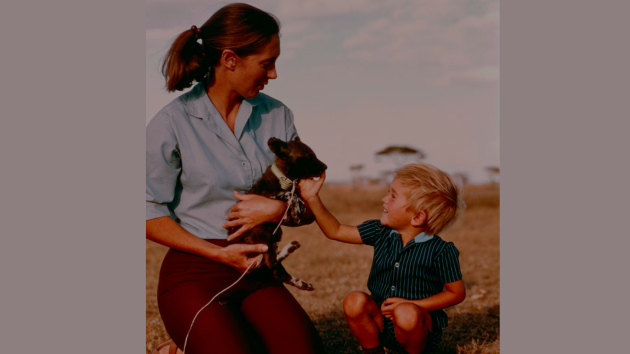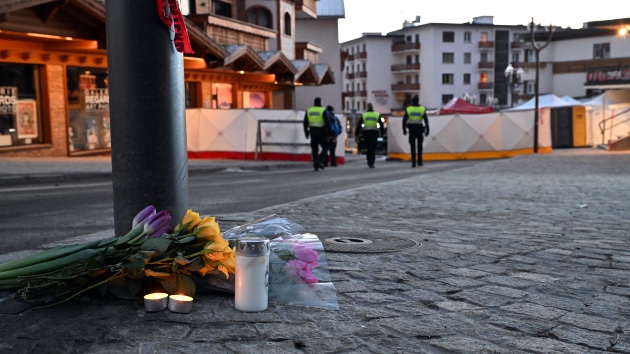Jane Goodall, famed primatologist and conservationist, dies at 91
Written by ABC Audio ALL RIGHTS RESERVED on October 1, 2025

(CALIFORNIA) — Jane Goodall, the famed primatologist, anthropologist and conservationist, has died, according to the institute she founded. She was 91 years old.
Goodall died of natural causes while in California on a speaking tour of the United States, the institute said in a statement on social media on Wednesday.
The British primatologist’s “discoveries as an ethologist revolutionized science, and she was a tireless advocate for the protection and restoration of our natural world,” according to the institute.
Goodall was only 26 years old when she first traveled to Tanzania and began her important research on chimpanzees in the wild. Throughout her study of the species, Goodall proved that primates display an array of similar behaviors to humans, such as the ability to develop individual personalities and make and use their own tools.
Among the most surprising discoveries Goodall made was “how like us” the chimpanzees are, she told ABC News in 2020.
“Their behavior, with their gestures, kissing, embracing, holding hands and patting on the back,” she said. “… The fact that they can actually be violent and brutal and have a kind of war, but also loving an altruistic.”
That discovery is considered one of the great achievements of 20th-century scholarship, according to the Jane Goodall Institute.
Goodall’s love of animals began practically at birth, she told ABC News. As a child growing up in London and Bournemouth, she dreamed of traveling to Africa and living among the wildlife. When she was 10, she read the books “Doctor Dolittle” and “Tarzan,” and the inspiration changed the trajectory of her life.
The initial arrival into Tanzania’s Gombe National Park proved to be challenging. The terrain was steep and mountainous, the forests were thick, and threats from buffalo and leopards lurked in the wilderness. But her lifelong ambition had finally been realized, and Goodall knew she was where she was meant to be.
“It was what I always dreamed of,” she told ABC News.
Goodall later earned a PhD in ethology, the study of animal behavior, from the University of Cambridge. Her thesis detailed the first five years of study at the Gombe reserve.
In 1977, Goodall founded the Jane Goodall Institute with Genevieve di San Faustino. Headquartered in Washington, D.C. with offices in 25 cities around the world, the organization aims to improve the treatment and understanding of primates through public education and legal representation.
Goodall’s research garnered both scientific honors and mainstream fame, and she was credited with paving the way for a rise in women pursuing careers in STEM (science, technology, engineering and math) over the years. The number of women in STEM has increased from 7% to 26% in the six last decades, according to The Jane Goodall Institute, which cited census information from 1970 to 2011.
In 1991, she also founded Roots & Shoots, a global humanitarian and environmental program for young people.
She was named a United Nations Messenger of Peace in April 2002. The anthropologist continued to lend her voice to environmental causes well into her 80s and 90s.
In 2019, Goodall acknowledged the climate crisis and the importance of mitigating further warming, telling ABC News that the planet is “imperiled.”
“We are definitely at a point where we need to make something happen,” she said. “We are imperiled. We have a window of time. I’m fairly sure we do. But, we’ve got to take action.”
Goodall even partnered with Apple in 2022 to encourage customers to recycle their devices to reduce individual carbon footprint and cut down on unnecessary mineral mining around the world.
“Yes, people need to make money, but it is possible to make money without destroying the planet,” Goodall told ABC News at the time. “We’ve gone so far in destroying the planet that it’s shocking.”
Goodall emphasized in 2020 that there is still much to learn from “our closest-living relatives.”
“They’re still teaching us,” she said during the diamond jubilee anniversary of studying the species.
During the COVID-19 pandemic, Goodall hypothesized that humans brought outbreak upon themselves, given that bats were the suspected driver of cross-species contraction of the virus.
“We have disrespected the natural world. We’ve disrespected animals, and we’ve been cutting down forests. Animals have been driven into closer contact with people. Animals have been hunted, killed and eaten. They’ve been trafficked,” she told ABC News in 2020. “So, animals of different species have been crowded together in the wild animal meat markets in Asia, bush meat markets in Africa, and this creates a fantastic environment for a virus or bacteria, virus in this case, to jump from an animal to a person.”
Goodall’s place in pop culture history was further cemented in 2022 when toymaker Mattel announced a special edition Barbie doll modeled after Goodall in honor of the 62nd anniversary of her first visit to Tanzania’s Gombe National Park.
“My entire career, I’ve wanted to help inspire kids to be curious and explore the world around them,” Goodall said in a statement at the time.
The doll is dressed in a khaki shirt and shorts, and holds a pair of binoculars and a notebook. The doll itself is also sustainable, made from ocean-bound plastic.
Goodall was the recipient of several honors throughout her life. In 1995, she was appointed a Commander of the Order of the British Empire for “services to zoology” and promoted to Dame Commander in 2003. Goodall’s other honors included the French Legion of Honor, Japan’s Kyoto Prize and the U.S. Presidential Medal of Freedom.
She is survived by a son, Hugo Eric Louis van Lawick, from her first marriage to Dutch nobleman and wild photographer Baron Hugo van Lawick, as well as three grandchildren. Her second husband, former Tanzanian parliament member Derek Bryceson, died of cancer in 1980.
Copyright © 2025, ABC Audio. All rights reserved.





